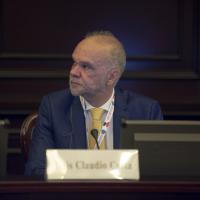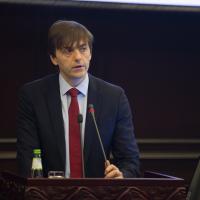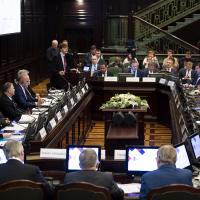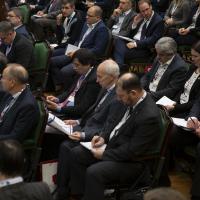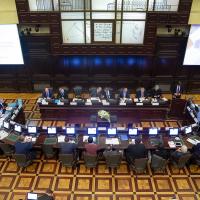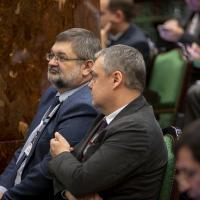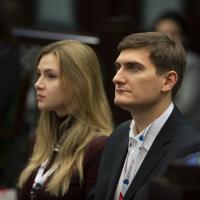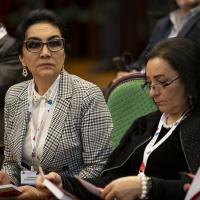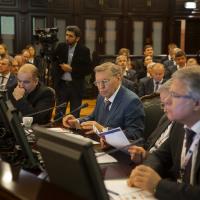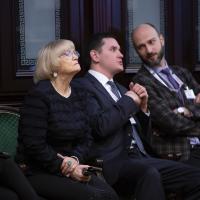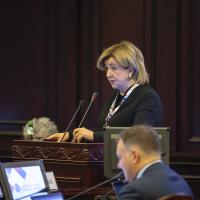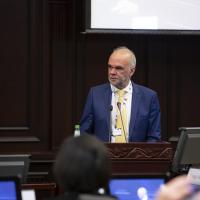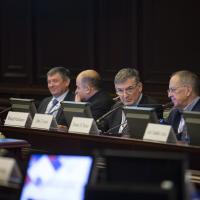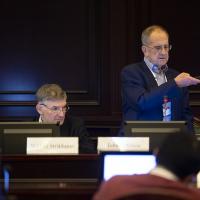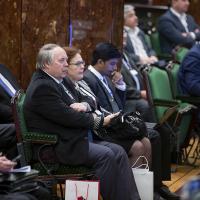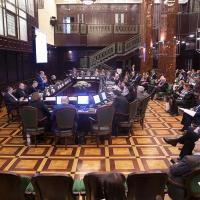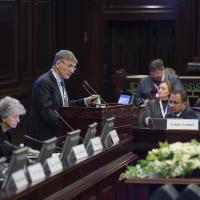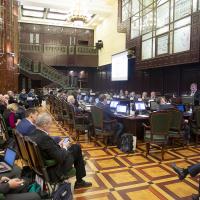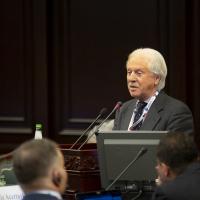"The Third University Mission" international conference, dedicated to the development of cooperation between universities and society, has been held from November 30 to December 1, 2018 in Moscow. The conference events were attended by over 260 delegates from 23 countries, including Argentina, Brazil, Indonesia, India, Italy, Poland, Russia, Spain, United States, and United Kingdom. The great interest in the conference was driven by the growing need in studying the third mission of the university, i.e. its contribution to the development of society.
The conference was opened by the President of the Russian Rectors Union, rector of Lomonosov MSU Viktor Sadovnichy. He spoke about the work on the Moscow international rating of universities "Three University missions ", which appeared following a broad discussion in the Russian Rectors Union with the involvement of leading ratings experts from 12 countries. The rating is one of a half dozen proposals of the Russian Rectors Union, which were supported at the state level.
According to Sadovnichy, the third mission of the University is, first of all, its social responsibility, its position and role in society, in the region and in the country. Analysis and evaluation of the relationship between the University and society is achieving more and more value in various rankings, but at the moment is present in the most complete form only in the Russian ranking. The President of the Russian Rectors Union stressed that all ratings were subjective to some extent, so ranking’s authors tried to achieve the greatest objectivity in the evaluation of Universities. The rating uses an unprecedented wide range of information sources, and the methodology is fully open. In May 2018, the rating successfully passed an independent audit of the PricewaterhouseCoopers Audit, a part of PwC's global network.
The Head of the Federal Service for Supervision in Education and Science of Russia Sergey Kravtsov assured that his organisation would use the Three University Missions ranking including the reformation of university accreditation and education evaluation, which are under discussion now. He added that any rating should give not only a current assessment of a particular University's activity, but also take into account what kind of a graduate the country will need in 10-20 years, and show where the education system is moving.
The Deputy Minister of Science and Higher Education of Russia Marina Borovskaya noted that a ranking is a support and decision-making system, a prioritising method for work planning, it is a back-up for university management, as well as managing the education system within a region or country.
After the plenary session, the discussion of the third mission continued at the thematic sections of the conference. One of the sections was devoted to the transfer of knowledge, which was moderated by the Life Fellow at Queens' College, Cambridge University John T. Green and the rector of the National Research Nuclear University MEPhI Mikhail Strikhanov.
John T. Green announced topics of the session, in particular, reports on the transition of technologies from universities in the company on the example of China, prospects of education in Italy, importance of student exchange programs, experience of a number of Russian universities. In his speech, he highlighted the importance of choosing a strategy for the University development, the reformation of its management and administration, noted the relevance of an interdisciplinary approach. John Green drew attention that business schools in the UK are widespread, whereas in Russia they are still rare. United Kingdom universities are more focused on knowledge transfer and interaction with the business community and it is the needs of students that determine the further development of higher education institutions. John Green, the former chief coordinator of the Imperial College London, shared his experience: "That transition was quite risky. For example, at first our traditional classical University fell in the ranking, but it was only for a while. Instead we took into account and implemented the desires of our students, they wanted to develop entrepreneurship". The speaker once again noted that restructuring was a risky step, which entails fundamental changes, but the people who manage universities should be able to accept such responsibility, and this section can help universities to exchange international experience.
On the example of MEPhI, rector Mikhail Strikhanov spoke about the latest trends in education, the use of modern technologies, partnership with the government and business, export of education, and also made proposals to optimize the ranking, in particular, by including such indicators as citation and publication activity reflected in authoritative publications.
During the conference, three sections were held, about 40 speakers made presentations and shared their extensive experience. About 200 experts, representatives of the University community from Russia, Brazil, the USA, great Britain, Germany, India and other countries discussed at the conference the continuity of education, knowledge transfer, the impact of the University on business, Economics, technology development, social involvement of universities.





